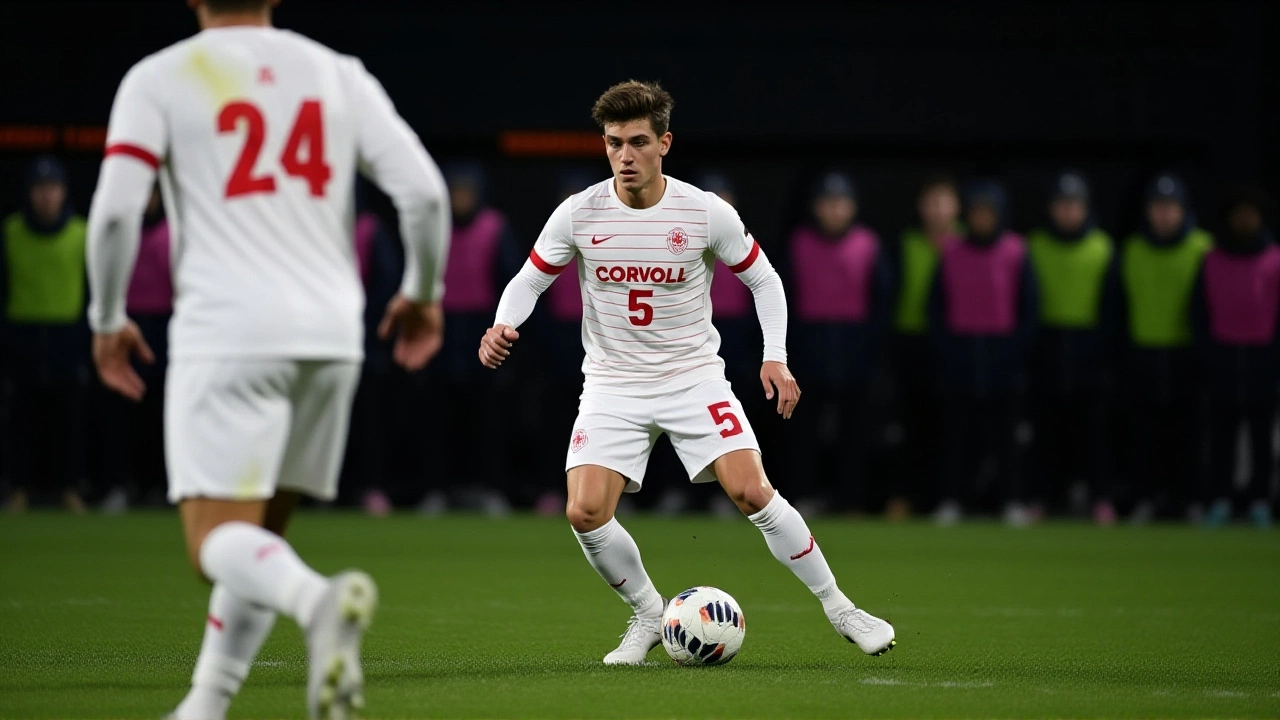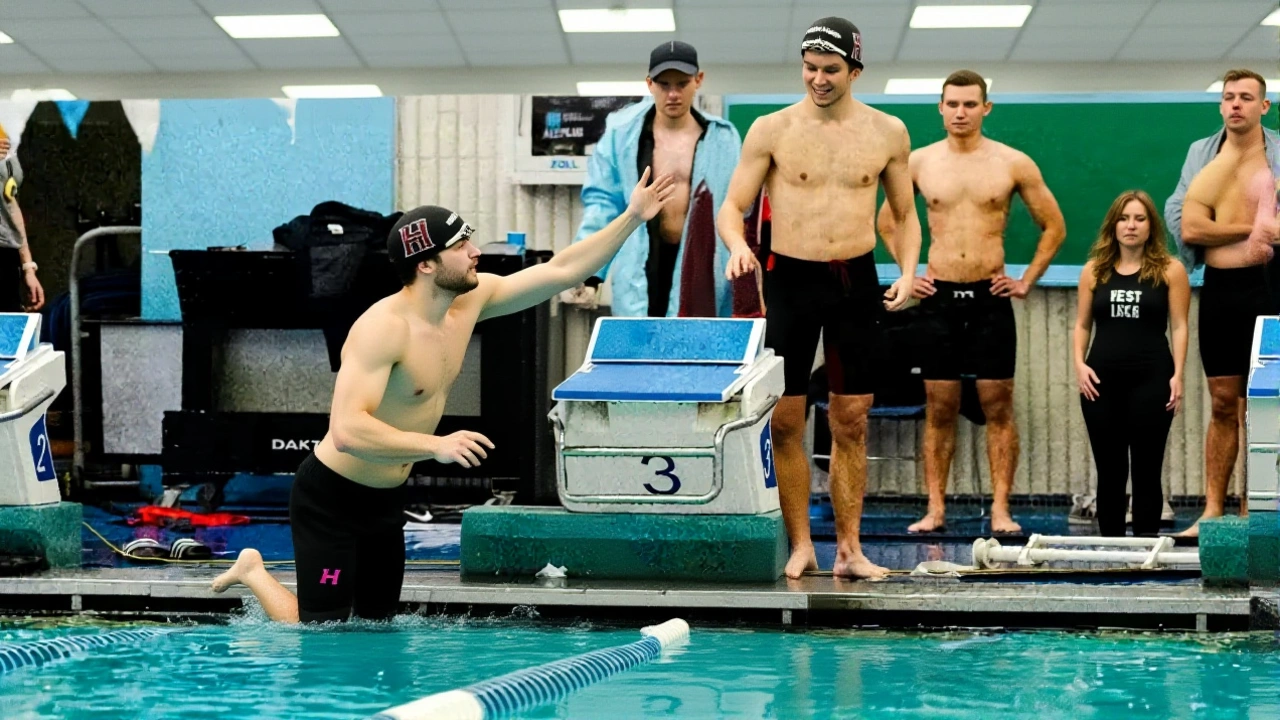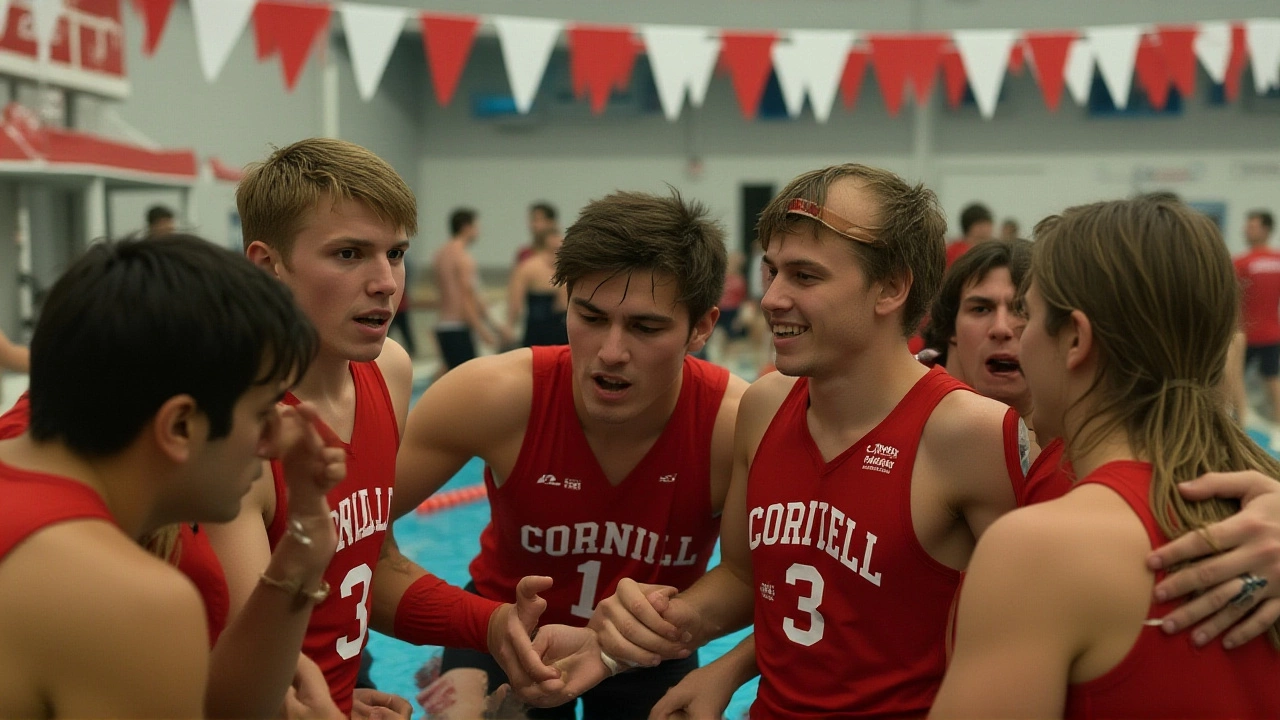On November 22, 2025, at Teagle Pool in Ithaca, New York, the Cornell University Big Red men’s swimming and diving team delivered a commanding win over the University of Pennsylvania but were overwhelmed by the powerhouse Princeton University men’s squad in a dramatic Ivy League tri-meet. Cornell defeated Penn 171–129, showcasing resilience in the pool and on the boards — but fell 209–91 to Princeton, a result that underscored just how far the Tigers have risen since their last Ivy title in 2016.
Princeton’s Diving Dominance Shook the Ivy League
The most startling display of depth came from Princeton’s divers. In the 3-meter event, the top four finishes were all Princeton: Luca Fassi (369.75 points), Chase Sorosky (363.20), Taso Callanan (338.90), and Luka Martinovic (317.30). Martinovic then turned around to win the 1-meter dive with 327.25 points — a performance that left Penn’s top diver, Rachel Yang, in second place at 275.40. No other team in the league even came close to matching that level of control. "It’s not just about one great diver," said Princeton head coach John H. B. B. Smith in a post-meet interview. "It’s about building a culture where four guys can go 1–2–3–4 and still be hungry for more."Relays and Freestyle: Princeton’s Speed Is Unmatched
Princeton didn’t just win on the boards — they owned the water. The Tigers swept both relays: the 200 medley relay (1:21.41, led by Lucas Strobek, Anuthra Abeysinghe, Conan Chen, and Tomaz Chevres) and the 400 freestyle relay (2:52.55, with Patrick Dinu, Ryan Noguchi, Daniel Li, and Mitchell Schott). Dinu, already a force, set a new Princeton program record in the 100 freestyle prelims at 42.16, then won the final in 42.42. Schott, meanwhile, shattered the meet record in the 200 butterfly with a blistering 1:40.42 — a time that now stands as the fastest in the Ivy League this season. The 1000 freestyle was another Princeton showcase. Santiago Gutierrez won in 9:05.54, followed by teammates in second, third, and fourth — a complete sweep that left Cornell and Penn scrambling for points. Gutierrez also set a new school record in the 1650 freestyle at 14:58.62, a performance that quietly signaled Princeton’s long-distance supremacy.Cornell’s Bright Spots Amid the Loss
For Cornell, the win over Penn was a morale booster. The Big Red captured seven individual events, including wins in the 200 backstroke and 100 breaststroke. Their divers, while overshadowed by Princeton’s avalanche, showed improvement — especially sophomore David Kwon, who placed fifth in the 3-meter with 287.10 points, a personal best. "We’re building," said Cornell head coach Mark T. Ellis. "We knew Princeton was going to be tough. But beating Penn? That’s a step. We’re not where we want to be yet — but we’re moving."
Penn’s Individual Brilliance Can’t Offset Team Gaps
The Penn Quakers had flashes of brilliance. Eddie Jin swept the 100 free (44.26) and 200 free (1:39.35), while Henry Guo led a 1–2–3 sweep in the 200 fly with a time of 1:48.76. But Penn’s lack of depth beyond a few stars was glaring. They scored only 129 points against Princeton — fewer than the Tigers earned in diving alone. "We have talent," said Penn head coach Julia M. Chen. "But we’re not a team yet. We’re a collection of strong swimmers. That’s not enough in this league."The Bigger Picture: Princeton’s Return to Dominance
This tri-meet wasn’t just a win — it was a statement. Princeton entered the 2025–26 season with a 3–0 record and ended it as the clear favorite for the 2026 Ivy League Championship. Their 1,330-point win at the 2025 Ivy League Championship on March 1, 2025, ended a nine-year drought since their last title. Harvard finished second with 1,262.5, Yale third with 1,212.5. Princeton’s 32nd Ivy title was the most by any program in league history — and they’re not slowing down. The Tigers’ success stems from a deliberate, long-term strategy: recruiting elite divers early, investing in strength and recovery science, and developing a culture where second place is treated as failure. "We don’t talk about winning the meet," said assistant coach Emily R. Park. "We talk about winning every turn, every dive, every stroke. The rest takes care of itself."
What’s Next? The Road to 2026
With the 2026 Ivy League Swimming & Diving Championships set for February 25–March 1, 2026, Princeton enters as the team to beat. Cornell will focus on closing the gap in diving and relays. Penn must develop depth beyond its top swimmers. Harvard, coming off a narrow loss to Columbia on November 21, will look to rebound. But right now, the league belongs to Princeton.Meanwhile, Columbia’s meet against Harvard on November 21, 2025, offered its own drama. Joseph Nicol won the 3-meter dive with 358.35 points, and Will Cooley took third in the 1-meter with 300.60. Head diving coach Scott Donie called it "a great showing all around," and the Lions are quietly building toward their own breakthrough season.
Frequently Asked Questions
Why is Princeton so dominant in diving?
Princeton has invested heavily in its diving program since 2020, hiring specialized coaches and integrating biomechanical analysis into training. The result? Four divers placing top four in the 3-meter event at the 2025 tri-meet — a feat unmatched in the Ivy League in over a decade. Their divers train year-round with Olympic-level video feedback systems, giving them a technical edge.
How did Cornell manage to beat Penn despite losing to Princeton?
Cornell’s win over Penn came from superior depth in mid-distance events and strong performances from underclassmen. While Penn relied on a few stars like Eddie Jin, Cornell had seven individual winners, including two freshmen who posted career-best times. The Big Red also capitalized on Penn’s weaker relay teams, winning both medley relays and finishing second in the 400 free relay.
What does Princeton’s 2025 championship mean for future recruiting?
Princeton’s 2025 title — their first since 2016 — has made them the most attractive Ivy swimming program for elite recruits. Their 2026 incoming class includes five national high school champions, including two All-Americans in diving. Coaches report a 40% increase in inquiries from top-tier prospects since March 2025, signaling a new era of dominance.
Are there any injury concerns heading into the 2026 championship?
Princeton’s top swimmer, Patrick Dinu, is recovering from a minor shoulder strain but is expected to compete. Cornell’s star sprinter, Marcus Rios, missed the tri-meet with a hamstring issue and is listed as day-to-day. No major injuries were reported among Princeton’s divers, who have benefited from a new dryland recovery protocol introduced in October 2025.
How do these results compare to past Ivy League seasons?
Princeton’s 1,330-point win in 2025 was the largest margin of victory since 2010, when they won by 1,412 points. The gap between first and second place (67.5 points) is the smallest since 2018, suggesting increased competition. But Princeton’s depth — sweeping relays, diving, and freestyle events — mirrors their 2016 championship team, which also won 12 individual events.
What’s the significance of the 2026 Ivy League Championships being held at Brown University?
Brown’s Pizzitola Sports Center has hosted the event three times since 2010, and its 50-meter pool with advanced timing systems often produces faster times. Teams are already analyzing splits from Brown’s 2023 meet, where 12 Ivy records fell. Princeton’s coaching staff has scheduled a training camp there in January to acclimate swimmers to the unique conditions.
 Nov, 23 2025
Nov, 23 2025
